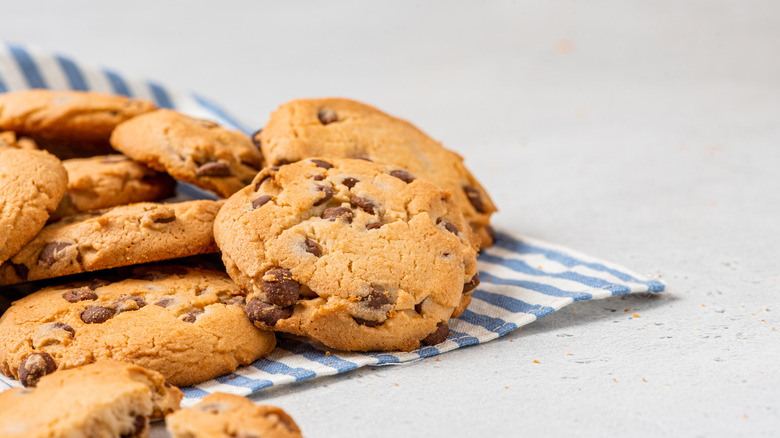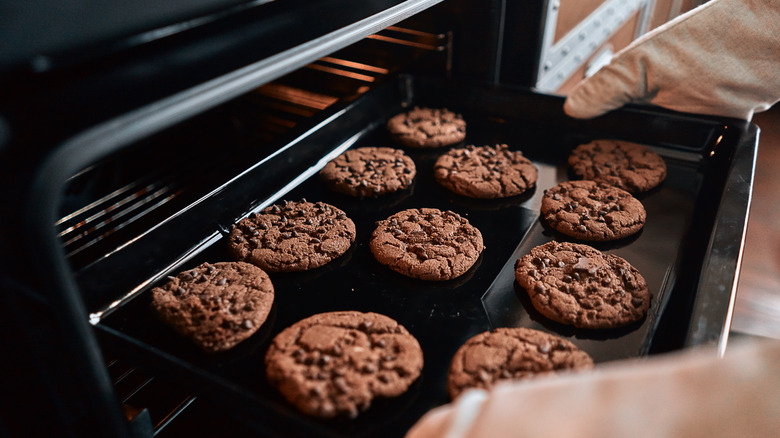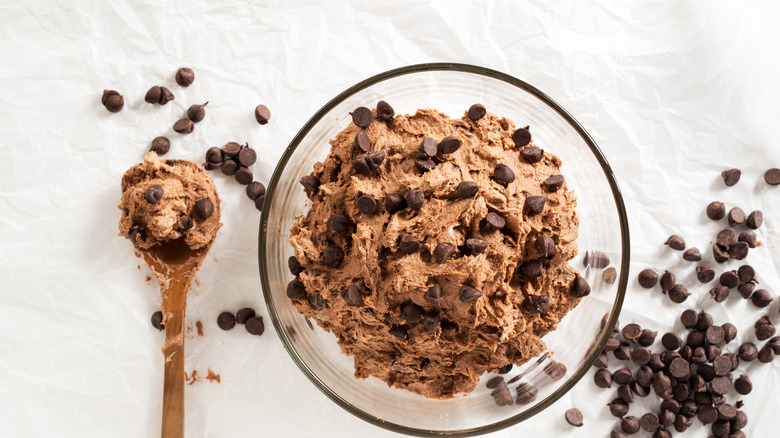The Must-Know Finishing Touch For Chewy Cookie Lovers
What's the best thing about a chocolate chip cookie fresh from the oven? Is it the smell of the melting chocolate or the burnt sugar? Is it because they're so hot that, despite knowing they could singe your mouth, the temptation is still too great to resist? While these are all good qualities of a fresh-baked cookie, perhaps the best thing about them is that they're still chewy. They have a light golden-brown exterior around the edges but are still very soft and moist inside, giving you that perfect contrast of textures in a single bite. It's that magic moment when the cookies are still warm and chewy before they cool down — and harden.
There are a variety of ways to ensure that your cookies stay chewy. You may be familiar with the old trick of leaving a piece of bread in the storage container with your cookies, and the bread's moisture will help keep them from drying out (via Food Network). You could also try to seal and store your cookies in a cool, dry place, which will help prevent moisture's evaporation (via Fine Dining Lovers). You can enjoy soft and chewy cookies for longer if you can keep moisture out of them.
There's also a handy baking trick to know that will ensure your cookies come out chewy each time. It's just a matter of timing.
Let your cookies bake out of the oven
That heat is the cornerstone of a good cookie. Too much heat means you can overbake the cookies and get a burnt bottom that tastes more like charcoal than chocolate chips. Too little heat means your cookies come out raw and sticky instead of chewy and firm. Ensuring you get the chewiest cookies possible involves using residual heat instead of direct heat to finish baking the cookies.
Professional baker Molly Allen tells Insider you should keep an eye on your cookies as they bake, waiting for the moment when the edges begin to brown. As soon as that time comes, remove the cookie sheet from the oven and allow it to rest uncovered for just a few minutes. Allen says the lingering heat on the cookie sheet will finish baking the cookies, and this allows the cookies to be perfectly soft and chewy.
Using residual heat in baking seems to be a somewhat popular method in cooking. The Guardian details that you can capitalize on the residual heat of your oven by toasting nuts, drying off specific cookware, or drying out bread to make breadcrumbs. You could also pop in a few cookies to soften them while the oven cools, similar to Allen's method.
Are there any other ways to get chewy cookies?
Although the idea of letting your cookies bake outside the oven is interesting, it raises another question: is there anything else you can add to — or omit from — the cookies to make sure they come out extra chewy?
According to Food Network, if you're looking for chewy cookies, you should skip any granulated sugar and use light brown sugar alongside corn syrup in your cookie mixture instead. You should bake at 375 F for 10-to-12 minutes or until golden on the outside. If you want extra chewy cookies, add cake flour instead of regular flour and bake at the same temperature for 12-to-15 minutes.
King Arthur Baking also offers some suggestions for making a chewy cookie, including using butter instead of shortening and brown sugar instead of granulated sugar, similar to what Food Network suggests. Butter and brown sugar appear so much in chewy cookie recipes because they contain more moisture than the other ingredients, which helps promote a chewier, softer cookie.
Whether you're a fan of chocolate chip cookies or a good old-fashioned snickerdoodle, there's nothing like a warm, chewy cookie, is there? Then again, when isn't a good time to enjoy a cookie of any temperature or consistency?


